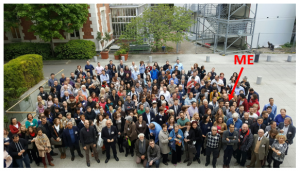Stacie Tardif brings us some lessons from those who have walked the path before us
The Danish Academy of Sciences and Papers recently hosted an event for PhD researchers in Denmark and their transition into post-doctoratal positions. Several guest speakers from very different backgrounds were invited to speak about their journey into their career, and to provide some insight and advice to us youngsters. With looming statistics
![Taylor, Martin et al. (2010) [1]](https://blogs2.qub.ac.uk/remediate/wp-content/uploads/sites/34/2017/05/06n84-300x240.jpg)
- Be a risk taker and take part of high risk/high return projects
- Is academia really for you? Have a plan B
- Go abroad and move away from your PhD supervisor
- Find a mentor
- Build a personal brand and generalist profile
- Don’t wait, apply for your own grants
The chairman of The Carlsberg Foundation, Professor Flemming Besenbacher, started off the day with an inspiring talk, appealing to our generation to embrace scientific social responsibility. He stated that the 21st centuries’ current global issues such as food production, water resources, and climate change can only be tackled with breakthrough innovations, and therefore as young individuals in society, he urged us to be risk takers:
![World Economic Forum (2015) [2]](https://blogs2.qub.ac.uk/remediate/wp-content/uploads/sites/34/2017/05/21stcenturyskills-300x187.jpeg)
World Economic Forum (2015) [2]
6 key elements for career planning:
- Understand yourself
- Develop your strengths
- Work with the best
- Share your success
- Innovate, don’t imitate
- Always work efficiently
Step 1 & 2- Know yourself and research your options
- What skills/competences do you want to use?
- What motivates you?
- What values are important to you?
- What kind of career do you want?
- What type of work environment do you enjoy working in?
- How should your workday be structured?
- What do you want from your career?
Step 3 & 4-Set goals and make a plan
- Make an informed decision about what is right for you and maybe have an idea for plan B
- Prepare to jump: network your CV and cover letter and practice your elevator pitch!
Regardless of our future in academia or not, the skills required to write an excellent grant application are highly transferable to writing up successful job applications. Throughout the day we received lots of good advice on the ins and outs of grant applications. Before starting the process of writing a grant or applying for a job position, strong emphasis is placed on reading the call, paying particularly close attention to the small subsections that describe the assessment criteria. It sounds silly to highlight, however, it seems to be one of the main reasons why applications are rejected. No matter how qualified the person or brilliant the idea, with a pile of imminent applications ahead of them, members of the panel are likely to be running on little to no sleep, and looking for reasons to shrink their pile.
Grant applications are all about you, your network and your great idea! But what is a great idea, you may ask?
- Original and inventive
- Well motivated in terms of impact
- Grounded in and relevant to research fields
The panel, which in many cases is comprised of 5% of researchers from your specific field vs. 95% from other related but different disciplines, want to understand your great idea! As a result, it is imperative to keep it focused, simple and concise. Many applications have very strict page limits (do not put anything in the appendices, the panel is not allowed to read them) but it is important to keep in mind that other people have the same restrictions as yourself, and so it is doable. Do not repeat the same information in the application as this is a waste of space and time for members of the panel. To save space, make use of figures and charts (e.g. Gantt charts) which can incorporate a lot of information in a small amount of space. Applying for funding through industrial post-doctorate positions is another way to go. These are typically 1-3 year positions carried out by a recent PhD graduate (under 5 years after graduation in Denmark) that have an industrial focus. It involves teaming up with a mentor in a public sector institution (academia) as well as a mentor within a company. You are extremely cheap labor and therefore it is inherently benefitial to the company (and yourself of course) to have you there so don’t be intimidated to approach companies with your great idea. In addition, several databases and professional matchmaking clusters are available to graduates seeking these types of opportunities. Most importantly, industrial post-doctorate grant applications in Denmark resulted in a 50% success rate in 2016 and a predicted 45% success rate in 2017. This is significantly higher than grants awarded for post-doctorate grants in the public sector. These positions can also serve as a foot in the door and a stepping stone to a more permanent position within the company.
Here are some grants to apply for in Denmark (similar one’s can be found in most countries); keep in mind that most of the time, these grants are not tied with citizenship:
- Carlsberg Foundation: http://www.carlsbergfondet.dk/en
- Danish Council for Independent Research (DFF): http://ufm.dk/en/research-and-innovation/councils-and-commissions/the-danish-council-for-independent-research (Notes: Grant to go abroad. Do not need to be Danish, only PhD graduate from a Danish university.)
- Industrial Post-doctorate funding: www.Innovationsfonden.dk
- Matchmaking clusters: www.clusterexcellencedenmark.dk. (Notes: Tied to Danish companies. Can be outside of Denmark.)
Other speakers throughout the day highlighted the importance of moving away from your supervisor and going abroad. This, at least in Denmark, seems to give you an edge over other candidates as you are not only developing your skills as a researcher and broadening your perspectives/ideas and visions, but also developing an international network which makes you very competitive. Debate was underway regarding the ease of movement once established with a family, however with proper preparation, one speaker even moved her entire family including children to another continent.

The importance of finding good mentors along the way was empahised on several occasions. These mentors can advise you on scientific matter, introduce your to relevant networks and people and help you understand the mechanisms and unwritten roles of funder organizations such as the public, private and research councils. Finding several different mentors along the way is also a good idea as they can advise you and teach you different approaches, skills and techniques. You will, of course, benefit in different ways depending on the mentor but finding at least one mentor that has the same interests/visions as you will be extremely valuable in the long run. Lastly, it is absolutely crucial that trust and honesty is built between you and your mentor. It is imperative that your mentor is able to tell you some hard truths along the way, if required.

It is important to understand that positions in academia are exceedingly competitive and there is some value in building a generalist profile, which can be adapted to several positions in different institutions. Instead of specializing very narrowly in a certain area, it may benefit you in the long run to have a profile and track record that is flexible.
“Uncertainty is the new normal: complexity is increasing and therefore this calls for a paradigm shift in science” Professor Basenbacher
As such, adaptability is crucial. It is also important to build a personal brand and work on your 30 second elevator speech. People want to know what you do but will quickly lose interest if you go into too much detail. If you are able to boil it down to several simple keywords/buzzwords, people will be able to categorize you, put you in a box and ultimately, shuffle you from one box to another depending on their needs. As academics, branding may seem like something that belongs in the business world, but try to think of it as being a recognizable expert or specialist in “blank” discipline. As your “brand” grows, this may open up new opportunities in the form of interviews, publications, podcasts, invited speaker talks and even local TV gigs and most importantly, new collaborations.
The most important advice we received that day was to be passionate about our work and to love what we do. Without this, success, whether that is through the academic route or otherwise, will be fleeting and somewhat anti-climactic. Needless to say, I walked out of the room feeling inspired and with a sense of urgency to get to work, be innovative, take risks and enjoy the ride!
For more detailed information about the day’s proceedings and individual speaker’s presentations use the following link: http://www.youngacademy.dk/da/Aktiviteter/Phd%20seminar.aspx
References
1. Taylor, M., B. Martin, and J. Wilsdon, The scientific century: securing our future prosperity. 2010: The Royal Society.
2. Forum, W.E. New vision for education: Unlocking the potential of technology. 2015. World Economic Forum, Geneva, Switzerland.


